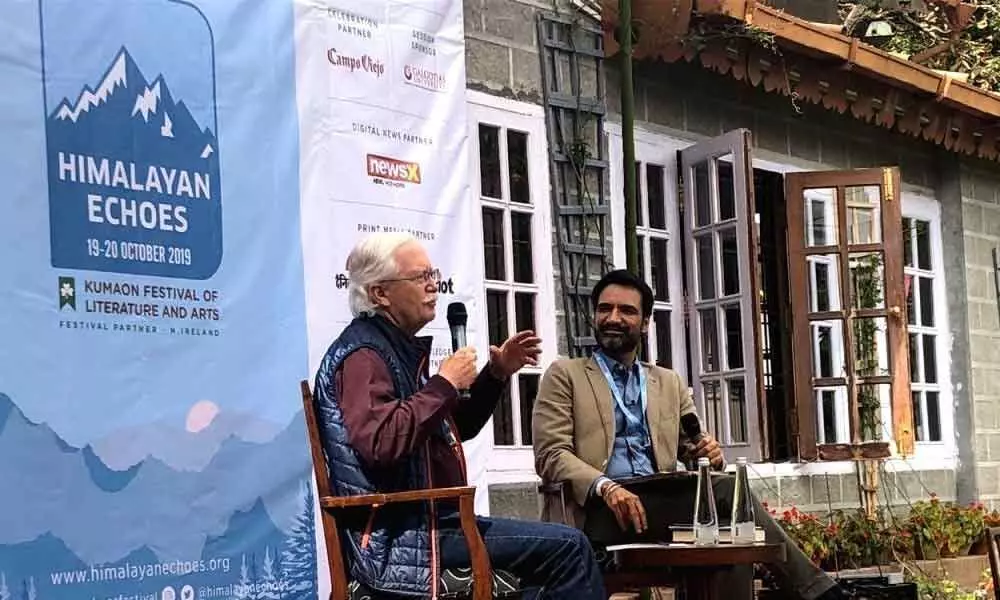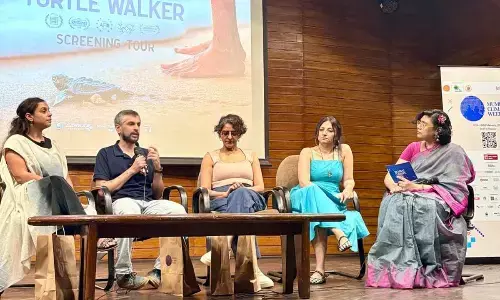Why Stephen Alter calls Himalayas home

The early winter air ran crisp in Nainital, and as India-born American author Stephen Alter sat facing the vast mountainscape, he fronted an audience, and a question on what made him fall in love with the Himalayas. "I didn't have much choice, because it is home," was his answer.
The early winter air ran crisp in Nainital, and as India-born American author Stephen Alter sat facing the vast mountainscape, he fronted an audience, and a question on what made him fall in love with the Himalayas. "I didn't have much choice, because it is home," was his answer.
Alter, who at 63 is exploring and documenting Himalayas with an unmatched fervour, was speaking at the fourth edition of Himalayan Echoes: Kumaon Festival of Literature and Arts here on Saturday.
The author was born, and spent his childhood years, in Uttarakhand's Mussoorie, and has dwelt on his seemingly favorite choice of subject, the Himalayas, in his last non-fiction book 'Becoming A Mountain'.
In his latest book, 'Wild Himalaya: A Natural History of the Greatest Mountain Range on Earth', published by Aleph in August this year, he has brought alive the greatest mountain range on earth in all its terrifying beauty, grandeur and complexity, and has penned his travels to all the five countries that the Himalayan range traverses - India, Pakistan, Bhutan, Nepal and China.
It is as if Alter, who regularly features the Himalayan mountains even in his works of fiction, dives into the deep Himalayan being, and comes up with his stories as treasure finds.
"For me, writing about the Himalayas comes very naturally. I come from Mussoorie, Nainital's sister hill-station. I find mountains as an endless reservoir of stories to draw from. After I finished my last non-fiction book, I realised that there were so many stories left to be told," he told his audience.
To say the least, the author-traveller is sublimed, as he puts it, by the sheer fear and awe mountains are capable of inspiring in a human being.
So, what endears him to mountains?
In a candid reply, Alter said: "I didn't have much choice, because it is home. When I returned to India after my education in the United States, and chose to settle in India in the Himalaya, I had the opportunity to travel beyond the Garhwal Himalayas which is what I knew."
The extensive treks and journeys, some of which even make it to his book "Wild Himalaya", run parallel to his deep understanding of the history, science, geology, environment, flora, fauna, myth, folklore, spirituality, climate and human settlements of the region.
"You think of Himalayas as this eternal, singular range that is this, but as you travel from valley to valley, you realise there are different ecosystems, different landscapes, different cultures.
"The diversity of the mountains is something that strikes me again and again - what I'm really in love with is the diversity and the surprises, you never know what's coming next."
For Alter, who confesses that it's a privilege living in the hills, Himalayas is a geological riddle he loves to untangle.
Never failing to amaze his readers and listeners with his passionate and researched storytelling, the writer presented a beautiful, little folktale that "echoes the scientific narrative on mountains".
"I begin my book with a short folktale of the Bugun tribe of Assam and Arunachal Pradesh. The story is that there are two brothers, one creates the earth, and the other creates the sky.
When the second brother tries to put sky on top of the earth, it's too small, so he asks his brother to squeeze in the earth, so he can fit the sky on top it, and that's how the mountain ranges rose up.
These are the stories that then reflect the geological narrative of tectonic forces pushing the mountains in the sky."
Alter concluded his well-attended session with a concern for the environment, and said that climate change affects the biodiversity of mountains.









